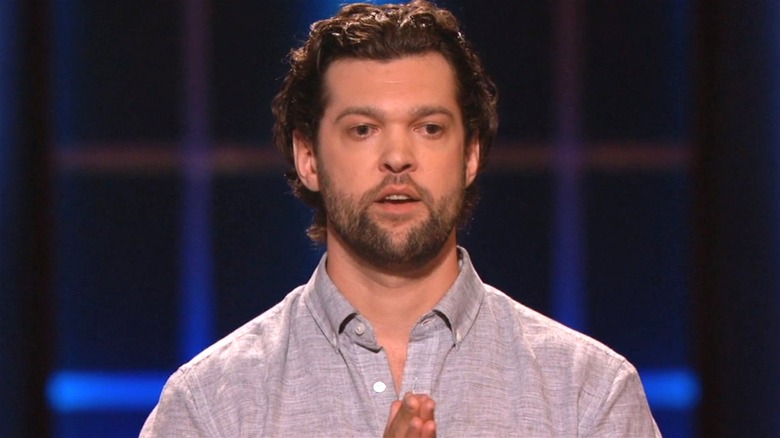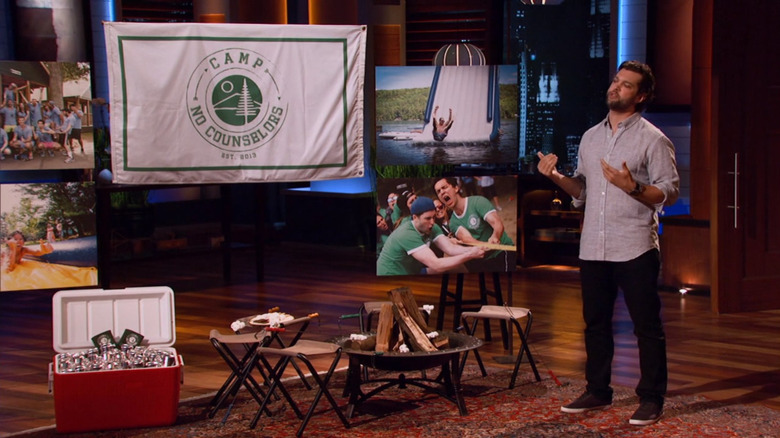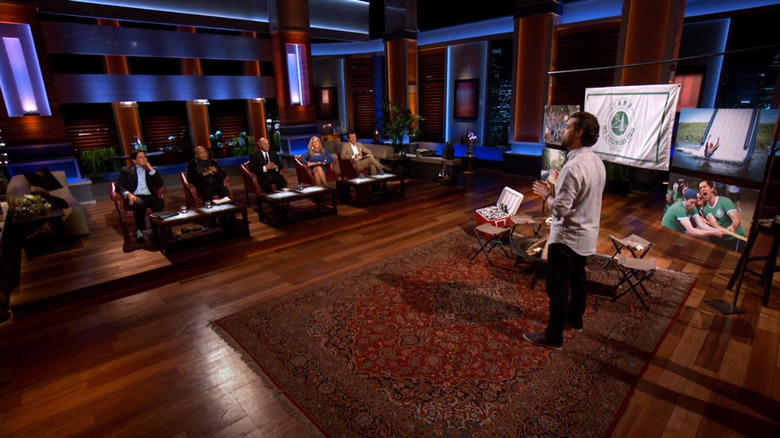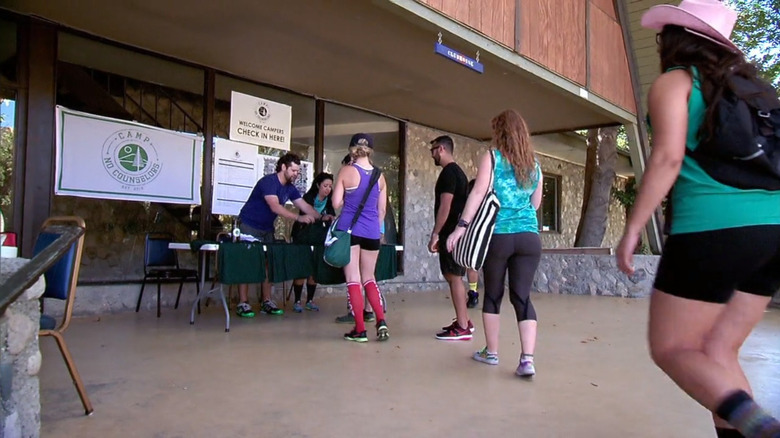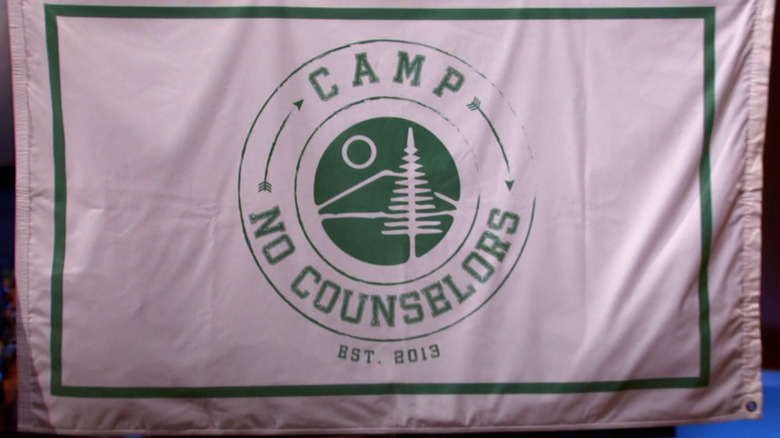Whatever Happened To Camp No Counselors After Shark Tank?
For many adults, summer camp is little more than a nostalgic memory from the days of their youth. However, one particular "Shark Tank" company dared to ask a bold question: why does camp have to be for kids? Thus, the idea for Camp No Counselors was born.
Featured on "Shark Tank" Season 7, Episode 28, Camp No Counselors was conceived by entrepreneur Adam Tichauer as an adult-focused getaway that allows participants to experience all the fun activities of a traditional children's sleepaway camp while also enjoying more mature benefits like open bars.
While this may sound like a novel concept to "Shark Tank" viewers, the business ended up having a rocky appearance on the show. But even though Camp No Counselors didn't quite find the success it was looking for while pitching the Sharks, that was far from the end of its story. Here's what happened on "Shark Tank," how things went for the business afterward, and whether it's still around today.
What happened to Camp No Counselors on Shark Tank?
During his segment on "Shark Tank," company founder Adam Tichauer explains the concept behind Camp No Counselors to the Sharks. The business has already been established, with the entrepreneur having negotiated with pre-existing summer camp locations across the United States to use their facilities during their off-seasons. While the early stages of Camp No Counselors provided a solid foundation, its founder is interested in expanding the operation and catering to a wider consumer base.
When the time comes for Tichauer to make his "Shark Tank" offer, he requests $300,000 in exchange for a 7.5% stake in the company. Unfortunately, neither the entrepreneur's business nor his strategy for growth resonate with many of the Sharks. After a few prodding inquiries, Kevin O'Leary, Robert Herjavec, Lori Greiner, and Daymond John all drop out of the negotiations.
In the end, Mark Cuban is the only Shark interested enough to make a counteroffer, proposing an investment of $300,000 in exchange for a far meatier 25% stake in the company. Tichauer ultimately refuses the deal, leaving Camp No Counselors without a "Shark Tank" partnership.
Camp No Counselors After Shark Tank
While Camp No Counselors didn't come out of "Shark Tank" with additional funding, the business nevertheless benefited from the "Shark Tank" effect, as many viewers were taken with the novel premise of an adult version of the classic camp experience. Following its pitch on the show, Camp No Counselors received a large amount of media attention from numerous outlets, boosting its popularity.
The ensuing years saw Camp No Counselors continue to perform well as a business, with supporters praising its replication of a traditional camp experience. In an interview with the BBC, Euromonitor trends consultant Daphne Kasriel-Alexander attributed the company's success to an increased desire among the adult populace for a reprieve from the everyday stress of daily life. "More adults are opting for active summer camps as a way for them to enjoy the perceived carefree times of childhood," she explained. "The real drivers of this interest in, and success of, adult summer camps are over-connectivity, work-life balance stresses, and sedentary lifestyles."
Even though Camp No Counselors enjoyed an upward trajectory for several years after its "Shark Tank" appearance, the business did eventually run into a major snag. As happened to many summer camps, the COVID-19 pandemic interfered with Camp No Counselors' plans for several years, as its core element of large social gatherings ran counter to quarantine protocols. Nonetheless, the business weathered the storm, continuing operations with a set of COVID-inspired safety guidelines.
Is Camp No Counselors still in business?
Camp No Counselors is still active and planning summers filled with activities. Though it's still best known for offering its classic adult camp experience, the business has expanded to cater to a number of specialized occasions and private events, including company retreats, weddings, bachelor and bachelorette parties, and birthdays.
In 2023, Camp No Counselors celebrated its 10th anniversary. However, the company has changed a lot, both from its point of inception and its appearance on "Shark Tank." Rather than holding events at various locations scattered across the United States, the camp now only operates in two distinct regions: New York and California. Moreover, the company is now under new ownership, as Joel Rutkowski purchased it from founder Adam Tichauer in 2019.
But despite Camp No Counselors' success, it has also attracted some controversy in recent years. Most notably, under Tichauer's tenure, the business was the subject of a legal dispute. The case saw Lakeside Retreats LLC sue Camp No Counselors and Tichauer for allegedly refusing to pay the rental costs after using its camp in 2018. Elsewhere, a public Facebook group contains posts from several people who claim Camp No Counselors canceled their reservations and never refunded them.
What's next for Camp No Counselors?
With more than a decade of operation under its belt, Camp No Counselors seemingly has no plans to close down any time soon. However, what is less clear is how, when, and if the business might expand its horizons.
In an interview with the BBC conducted around the time he made his "Shark Tank" pitch, founder Adam Tichauer expressed an interest in expanding Camp No Counselors to include a presence overseas. However, with Tichauer out and the company reducing its footprint to a mere two regions in recent years, it's unclear whether growth to an international level is still a priority for the company.
One goal that Camp No Counselors has been clear about striving towards is related to its efforts toward ecological sustainability. For the past several years, the company has engaged in a "Going Green" initiative, attempting to make each year's worth of camp events and activities more eco-friendly than the one before. Ultimately, the business says it hopes to become a 100% "green" company.
